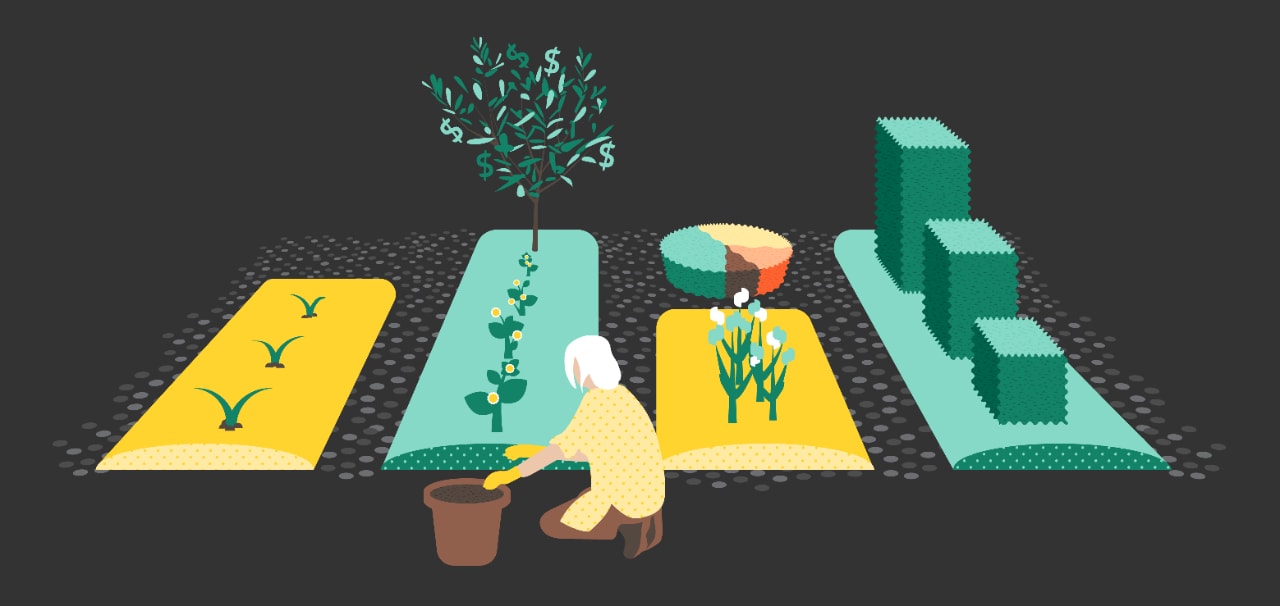Key takeaways:

Estate planning is the process of documenting your intentions for your assets, your loved ones and their financial future after your passing. While it can be hard to think about, putting together an estate plan ensures that your wishes are carried out as you hoped, and that settling your estate is as simple as possible for your family members and other beneficiaries. If you're a senior, putting together an estate plan now ensures you can enjoy your retirement with peace of mind.
Our estate planning guide has all the information you need to develop a plan that reflects your goals.
While your will is likely the most important part of your estate plan, there's more to the process. You'll also need to decide who you want to give powers of attorney to in the event that you're medically unable to make property, financial, legal and health care decisions.
Depending on your circumstances, you may also want to set up a trust. Trusts are instruments that allow a designated trustee(s) to manage assets on behalf of one or multiple beneficiaries, and can be beneficial if you have family members under the age of majority, or want to specify a use for the inheritance you're gifting.
In short, almost everybody needs an estate plan. But many Canadians put it off, often out of concerns about the cost or difficulty, or a feeling that they don't have enough assets to warrant creating one. Just 55% of Canadians have written wills, and only 40% have completed a power of attorney (POA) document, though older Canadians are more likely to have both, according to a 2019 study from the Financial Consumer Agency of Canada.1
If someone dies without a will in place, each province and territory has its own rules for distributing assets. These tend to favour traditional family structures, which may be at odds with who you'd most want to inherit your assets.
To get started, you'll want to compile documentation on all your assets, including any real estate you own, your bank accounts and investments, and any corporate documents if you're a business owner.
The list of documents you'll likely need include:
- Bank statements
- Stock and bond certificates
- Deeds and titles
- Your life insurance policy
If you have any debts, such as an outstanding mortgage balance or line of credit, you'll need to compile those documents as well. You may also consider putting all your important online log-in credentials in a safe place for your executor to easily access.
You'll want to select someone you trust to be your executor. Executors are charged with distributing your assets to your beneficiaries, as well as managing administrative issues related to your estate, such as formally closing accounts and notifying the government. You can choose multiple executors if it makes sense for you.
Naming a corporate trust or other impartial third party, such as a professional executor Scotiatrust can be beneficial if you have significant assets to disburse.
You should complete beneficiary designations for your investment accounts, workplace pension and any insurance policies. They tend to have simple forms that allow you to either name a sole beneficiary or split the account between multiple loved ones, and filling them out will ensure these accounts, including your RRSP, RRIF, FHSA and TFSA, bypass probate.
An important part of the estate planning process is completing your powers of attorney (POA) and health care directive documents. A POA designation allows someone you choose, to make important decisions on your behalf and act as your agent in the event you become incapacitated, for tasks including:
- Filing income tax returns
- Banking and paying bills
- Opening mail
- Talking with your accountants and lawyers
However, the appointment has some limitations. The person you name your attorney cannot write your will, designate your beneficiaries, or update your POA. This type of POA designation also only covers financial and legal decisions, not health care decisions.
Whoever you select in your health care directive (which in some provinces is called powers of attorney for personal care) will be able to make health care decisions for you if you're unable to communicate them yourself.
You can name your POA and health care directive while writing your will, whether that's on your own or with a lawyer.
If your financial affairs are relatively uncomplicated, you may be able to do this on your own. There are many online programs that now allow you to put together a formal will for $150 or less, or you can write it on your own and have a lawyer review it to ensure you've clearly articulated your wishes and have met all legal requirements.
In addition to your will, you can elect to write a memorandum of wishes. This document is not legally binding but can be the ideal place to detail who you'd like to receive items of personal significance that wouldn't be dealt with in a will — such as a prized hockey jersey or your wedding China — and even leave pearls of wisdom for your loved ones.
You'll likely need the help of a will and estate lawyer if you have more complex financial situation, such as if you own property outside Canada and reside out of the country for part of the year, co-own a cottage with family members, or own valuable art or antiques. Business owners who need to establish a succession plan or intend to sell their business at the time of their death should also consult with a professional.
You should seek out a lawyer if you need help navigating difficult dynamics between beneficiaries or have specific family needs to account for in your will, such as appointing a guardian for your child, ensuring a disabled child or another loved one will receive adequate long-term care, or providing spousal support for an ex-partner.
A will and estate lawyer can also help you set up your will in a way that allows you to minimize probate fees, and address how any outstanding debts will be repaid after your death.
Save 20% on your legal will with Willful*
Estate planning can be daunting. 43% of Canadians polled by Scotiabank revealed they don’t have a will. Willful takes estate planning from daunting to done by making it easy, accessible, and affordable on its secure online platform.
Create your last will and testament and power of attorney documents in as little as 20 minutes, with plans starting at just $99.
Scotiabank clients save 20% on any Willful plan.*

Contrary to popular belief, establishing a trust isn't just for the very wealthy. They can be a useful tool if you want to control how your beneficiaries receive their inheritances. Designated trustees manage the disbursement of these inheritances. For the purposes of estate planning, you'd likely set up a testamentary trust, though there are also living trusts that are active during your lifetime. A testamentary trust is the type you establish under a will and takes effect at death; the most common types of testamentary trusts are spousal and family trusts.
Spousal trusts are useful if your spouse might not have the financial acumen to manage your assets on their own or if they suffer from an illness or disability and need care after your passing. These trusts receive the same rollover treatment as if your assets were transferred directly to your surviving spouse — meaning they are received by the trust at cost rather than fair market value, and any unrealized capital gains are transferred from you to your spouse. No tax will be paid on those capital gains until the assets are sold or your spouse's death.
Family trusts, on the other hand, are for your children, grandchildren, or other relatives. These trusts are primarily meant to direct how your beneficiaries use their inheritance.
A family trust could be useful if you want to:
- Specify that an inheritance is meant only for a child or grandchild's education
- Protect assets until beneficiaries who are still minor children reach a certain age
- Ensure a family member with a disability receives care and financial support throughout their life
- Protect the inheritance of your adult children or grandchildren from creditors or ex-partners
While Canada doesn't have inheritance or estate taxes, an important part of estate planning is effective tax planning to maximize the value of the estate.
One way to minimize your estate's tax liability is to distribute some of your assets while you're still living — such as gifting your children and grandchildren part of, or all of their inheritances early and getting to see them enjoy it, or gifting stocks to a charity close to your heart.
Probate is the process of the court formally accepting a will and is the first step your executor will take to begin administering your estate. If someone dies without a will in place, the court appoints someone to act on their behalf.
Once your will is probated, your executor will be responsible for paying the required tax of your total estate plus any additional required fees, depending on the rules of your province.
You can work with an estate lawyer if you’re looking to minimize the probate tax on your assets. There are also multiple assets that don't require going through the probate process, including:
- Jointly owned assets with a right of survivorship (if it has been clearly established that the balance of a shared account would go to the living account holder)
- RRSPs, RRIFs, TFSAs with a designated beneficiary
- Insurance policies with a named beneficiary
- Some kinds of real estate
- Charitable and other gifts made during your life
- Assets in a trust you set up during your life
To ensure you aren't missing anything as you begin making your plans, use this estate planning checklist:
- Put together an inventory of your assets, and a list of any online login details your executor may need
- Select your beneficiaries for investment accounts, insurance policies and workplace pensions
- Designate your powers of attorney and your health care directive
- Choose someone you trust to be your executor; if you have significant and complex assets and/or sensitive family dynamics, consider an impartial third-party, such as a corporate trust company
- Create a will
- Consider giving gifts while you're alive
- Establish a trust if it makes sense for you
- Periodically review your will to ensure it's still up to date
With this guide to estate planning, setting your intentions doesn't have to be overwhelming, even if your financial picture is a bit more complex. Once you've set them out, it's good to review your intentions every three to five years to ensure they're still in line with your wishes.
This article is provided for information purposes only. It is not to be relied upon as financial, tax or investment advice or guarantees about the future, nor should it be considered a recommendation to buy or sell. Information contained in this article, including information relating to interest rates, market conditions, tax rules, and other investment factors are subject to change without notice and The Bank of Nova Scotia is not responsible to update this information. References to any third-party product or service, opinion or statement, or the use of any trade, firm or corporation name does not constitute endorsement, recommendation, or approval by The Bank of Nova Scotia of any of the products, services or opinions of the third party. All third-party sources are believed to be accurate and reliable as of the date of publication and The Bank of Nova Scotia does not guarantee its accuracy or reliability. Readers should consult their own professional advisor for specific financial, investment and/or tax advice tailored to their needs to ensure that individual circumstances are considered properly and action is taken based on the latest available information.
Sources:


